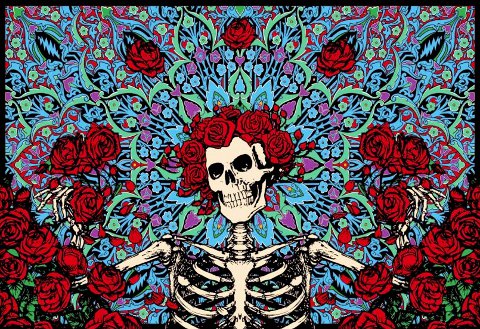Back in the early ’80s and thanks to hippie friends, I took a detour from my punk proclivities and indulged in the Grateful Dead. It was an awesome detour. I traveled up to Santa Fe several times to experience The Dead firsthand. Living on canned beans, kind veggie burritos, vitamin C and other unmentionable substances, I totally dug The Dead’s world. Kids in tie-dyed clothes whooshed past my outpost near the soundboard; they gleefully gamboled in the grass at The Downs at Santa Fe. The music was pretty awesome too. With a rhythm section to die for, dedicated keyboard antics and two guitarists who absolutely commanded the stage, I got hooked on both the scene and the music.If you missed the fanfare and frolicking, Peter Richardson’s No Simple Highway: A Cultural History of the Grateful Dead is a terrific place to begin your friendship with the dancing bears. Even if you were there, this biography amply fills in details you might have missed due to a combination of wanderlust, requisite/heroic drug use and blissfully anonymous, starry-eyed hookups.Richardson’s tome is necessarily completist, and it follows the evolution of the band from its beginnings in San Francisco through the glorious ’70s, past the tragedies of Ron “Pigpen” McKernan and the Godchaux duo (Keith and Donna Jean) and ultimately the untimely death of Jerry Garcia himself. The author paints a vivid picture, starting with Garcia’s introduction to psychedelic drugs in 1965. Before discussing the impact these trips had on Garcia’s musical hopes and dreams, the author spends a few pages discussing the cultural precedent for such experimentation, invoking the likes of Aldous Huxley and notable San Francisco poets prominent in the years before The Dead came of age.After mentioning Robert Duncan, Michael McClure and William Everson, Richardson lays out the importance of novelist Ken Kesey before trucking on to the cultural consequences these writers had on the developing talents of “head bear” Jerry and Dead lyricist Robert Hunter. It’s familiar territory, but the author imbues his narrative with a sense of wonder and awe for the world that set Garcia, Hunter and their peers on a course of rocanrol greatness and excess.The first portion of the book concerns itself with northern Califas in the ’60s: Hunter Thompson’s involvement with Hell’s Angels, the Merry Pranksters’ partytime reality, Kesey’s acid tests and the formation of the first incarnation of the Grateful Dead, a band called the Warlocks. Archived interviews with Garcia and company bring this history to life, allowing readers insight into the cultural forces that shaped America’s most fearsome yet forever flowery outfit.Midway through the text, the reader gains a palpable sense of the entropy present after the debacle at Altamont, the Manson murders and the trip the band took as they ventured, sometimes cynically, into the ’70s and beyond. As that tumultuous decade segued into the ’80s, The Dead—aware of their fading hippie identity—switched gears, glomming onto a simplified country aesthetic and sound; meanwhile, the band embraced a level of political awareness that led even pensive bassist Phil Lesh to publicly comment on the course of empire America was taking.Although personal tragedy, drug addiction and a rapidly changing American music culture fill the final chapters with awe and despair, Richardson’s narrative proves that The Dead truly reflected the times in which they were embedded. Jerry’s death put the kibosh on the business end of the Grateful Dead venture, quelling the constant touring that made the band a mainstay throughout their storied career; but, to quote a Bob Weir song that broadly paints the influence of the band on America’s youth and culture, “The music never stopped.”
No Simple Highway: A Cultural History of The Grateful Dead
Peter RichardsonSt. Martin’s Presshardcoverhistory$26.99










